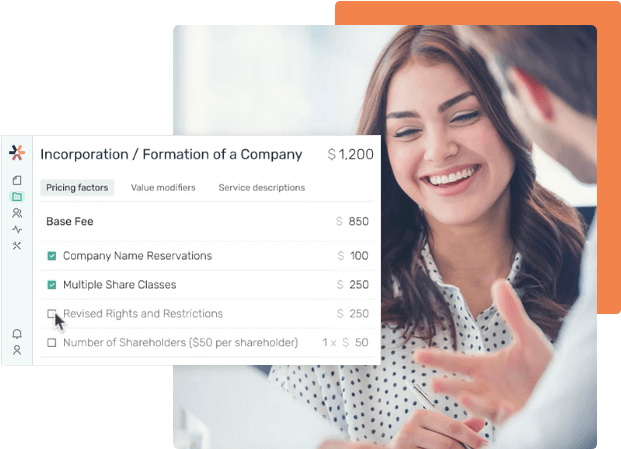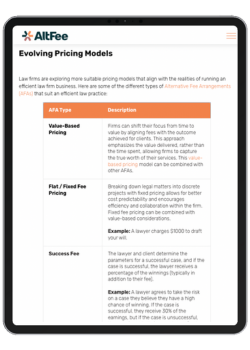- Resources
- Law Tech vs. Legal Tech: Differences and Recommendations
Table of Contents
There’s no doubt that technology has changed the legal industry immensely. From enabling remote work to take place seamlessly to increasing access to justice through firms being able to offer secure, remote correspondence with clients, the leaps and bounds that modern tech has provided to law firms are unprecedented.
But it’s not just law firms that are benefiting from the rise in law-related technologies. Direct B2C software has entered into the woodwork as well, allowing the average person to do simple legal business on their own. While do-it-yourself Last Will and Testament kits and other basic documents have been found in office supply stores for years, consumer-focused guided law is rising to include more and more DIY solutions.
In this article, we’ll uncover the difference between two distinct but often-used-synonymously terms: law tech and legal tech, and what these different technologies mean for law firms.
Law Tech vs. Legal Tech: What is the Difference?
While both legal tech and law tech could be terms that are often used synonymously, it seems that the industry is starting to explore the possibility of splitting the two. Academic articles explaining the differences between law tech and legal tech have been published, while law firms and legal-focused technology companies, and other legal entities are beginning to describe the differences between the two terms as well.
Legal tech, then, refers to technology that helps law firms and legal professionals directly, like law firm knowledge management software or a case management system.
Law tech, on the other hand, was created to allow easier access to certain legal services, like document creation, for individuals and businesses via self-service options. In other words, what makes them different is that law tech is for the clients, while legal tech is for your firm.
| Law Tech |
Legal Tech |
| Geared towards consumers and businesses |
Geared towards legal professionals and law firms |
| Online legal companies that provide self-service legal documents, online legal services, and more |
Legal technology solutions that are aimed at improving law firm operations |
When we talk about legal tech, it refers to the technologies legal firms can utilize to make their work more streamlined and improve operations. These tech solutions help firms perform their daily tasks with efficiency and convenience, saving more time for other important work.
Law tech, on the other hand, helps clients and small businesses gain more access to law by allowing them to self-serve. The centralized idea with law tech solutions is to provide a DIY legal service or product for individuals to become more empowered with the proper knowledge about the law.
Law Tech for Consumers and Businesses
Benefits of Law Tech
While at first glance, law tech may seem to take away business from law firms and legal professionals, looking at it from a different perspective, it could be seen as a way to further modern approaches to moving the industry forward.
1. Satisfies Evolving Client Demands
A legal trend report by Clio reports that the majority of consumers prefer a legal professional willing to offer their services both on-site and remotely. This is all about the lawyer’s flexibility, making it more convenient for the client.
Some law tech organizations offer direct legal counsel to clients, allowing firms and legal professionals to connect with customers directly through their platforms. This may be a lucrative way for law firms to meet the evolving demands of clients while at the same time increasing their client base due to the platform’s wide reach.
2. Fills a Gap in the Market
DIY legal documents, as an example, have been around for decades, often purchasable in office supply stores. It’s natural that these documents would move online, offering consumers the same solution in a digital format. In other words, digitally available DIY legal documents available online are an inevitability and address a need that would otherwise leave a gap in the market.
What this highlights is the importance of demonstrating value for legal services rather than focusing on a dollar amount per hour. When consumers of legal services see the value of dealing with a legal professional over opting for DIY solutions, stronger attorney client relations are established, leading to more consistent, long-term clients for firms and lawyers.
3. Gives Better Access to Justice
Law tech solutions ensure it’s easier to access justice in a variety of ways. For instance, video conferencing technology has positively impacted the underserved and people who had struggled more with accessing legal services, including the following:
- People residing in rural areas
- People not living near any legal professional qualified to take their case
- People working in situations that cannot allow them to leave and meet to discuss their case
- People with elder-care responsibilities
- Those with disabilities
The ability to seek legal services online can also provide a potential solution for those who fall within the gap of not being able to afford a lawyer, but also not qualifying for legal aid. While online tech law offerings might not be a magic bullet solution, they could help increase access to justice for this group by providing some avenues for enabling these people easier access to documents and shorter counsel sessions.
Law Tech Companies to Keep an Eye On
As much as it’s exciting to work with startup companies in the legal industry, several law tech solutions and platforms are still more trusted because of the reliability and reputation they have built over the years.
A few of these types of firms include LegalZoom, Rocket Lawyer, and Lexcheck, which are outlined in a bit more detail in the table below.
| Law Tech Company |
Purpose |
Benefit |
| LegalZoom |
Provides access to attorneys as well as self-service legal tools for individuals and businesses |
Allows DIY legal document creation, and connects people with attorneys through a wide-reaching platform |
| Rocket Lawyer |
Provides online legal services such as estate plans to individuals and small to medium-sized businesses |
Makes creating documents simple and affordable |
| Lexcheck |
A platform that uses AI to review and edit contracts |
Reduces costs and time associated with tedious tasks like contract creation |
| Equity Shift |
Allows companies to sell, transfer, and issue their restricted securities. |
Digitizes approval, counterparty participation, legal disclosures, contracts, payments, closing, and more for a more streamlined and straightforward workflow |
| Law Student Connect |
Targeted at law students, legal educators, judges, and lawyers. This online platform creates an avenue where these people can be closer to legal education while reducing the cost of most legal services |
Connects law students with jobs and also features a unique marketplace of short-term legal projects and research where law students can apply and get paid. |
Shifting Gears to Legal Technology
Now that we’ve gone through the differences between law tech and legal tech and discussed how law tech fits into the conversation surrounding the modern legal industry, it’s time to shift gears and dive more into legal tech for law firms.
Legal Tech for Legal Professionals and Law Firms
Types of Legal Tech Available
As you start to establish what your firm needs for a more holistic client experience, it’s best to have a clearer picture of the available legal tech solutions in the market. Based on your business goals, you must be aware of precisely what you need to prevent overspending..
Yes, there are various legal tech solutions available. But if you know what your firm needs to improve operations, streamline the client experience, or increase profitability, it’s easy to narrow down your options. The following are the most common types of legal tech available and widely used by legal firms.
| Type of Legal Tech |
Main Purpose |
| Practice Management |
Managing data related to your entire legal practice |
| Matter Management |
Managing all information about the case |
| Pricing Software |
Systemized approach to pricing to maximize firm revenue |
| Legal Billing Software |
Billing and time tracking features for efficiency |
| Client Management |
Making your firm more client-centric, ensuring your clients get the best experience |
| Analytics and Reporting |
Tracking your firm’s performance to know how you can improve |
1. Practice Management
Practice management platforms are comprehensive solutions that ensure management of everything related to your firm’s matters, cases, practice, and clients. These legal practice CRMs also help legal professionals access high-level information, such as determining available resources, your budget for various matters, and billable cases.
Practice management solutions can also help firms store their client’s information in the best way possible. The software is a centralized database where team members can access your client’s contact information, making it ready-to-use and easy to navigate.
Practice management solutions are also important for streamlining contract workflows according to your client’s rules, ensuring your team’s efficiency is maximized.
2. Matter Management
Matter management is typically one of the first tech solutions purchased by most legal firms because it helps with case management. This tech solution can store essential contact information, handle case accounting, and track important dates.
Matter management platforms are also usually automated, allowing easy access and collaboration among your team members.
3. Pricing Software
Implementing pricing software sets your firm up for financial success by systemizing the approach to pricing client matters in a process-driven way that allows for collaboration and the continuous honing of pricing structures based on past pricing experiences.
This is especially true in the case of Alternative Fee Arrangements. With legal pricing software, firms can collaborate among team members to create pricing models that make sense for each client without having to track or organize data across multiple platforms or outdated spreadsheets. One example of this type of solution is AltFee, which makes it easier for firms to develop AFAs for clients using collaborative digital software.
Start Earning More Revenue with Fixed Fees
Break free from hourly pricing and take the fear out of scoping and pricing client projects to start maximizing profitability.
Book A Demo
4. Legal Billing Software
Legal billing software is another type of essential legal tech because it allows easy capturing and monitoring of billable hours in your firm. This helps reduce the time you need to manually produce and countercheck invoices, allowing your team members to accomplish other tasks.
Legal billing software makes it easy for firms to create contact and client lists, so it’s more convenient to track time spent on each client's file; this allows for quicker and more accurate bill generation. This tech solution allows secure online access so your team can readily update records.
This tech solution handles the following:
- Internal budgets
- Fee protocol enforcement
- Analyze spending trends
- Track and monitor service provider performance and costs
Legal billing software also allows instant data retrieval because it can help firms maintain secure electronic records of all their clients. It also features a search bar where you can quickly type in the keywords of the information you need.
And because everything is password protected, you will be less worried about potential scams and data breaches.
5. Client Management
It’s a fact that most firms don't prioritize getting a client management tech solution. They should be more aware that a client management platform ensures everything is convenient and accessible for your clients.
These tech solutions help ensure clients are satisfied with the services you offer, and help foster good client-attorney relations. A good client management system can help track important dates for meetings, provide a way to communicate better with your clients, and provide helpful educational information.
One of the only ways your firm will know how to improve is when you regularly track your performance and other metrics. This is why getting an analytics tech solution is ideal even when you already have separate practice and matter management.
Tracking metrics like realization rate, collection rate, and utilization rate are important to support effective law firm management. Rather than tracking these metrics manually, analytics and reporting software can track these automatically, and make useful connections displayed with visual reports that can help you make data-driven and educated decisions about your firm’s finances and operations.
Legal Tech Vendor Checklist
Like preparing a checklist of everything you should buy before going to the supermarket, you must also have a complete vendor checklist of what features your legal tech should have. To help you out, we’ve curated some of the most important factors to consider and include in your checklist.
1. Meeting Security Requirements
The data you handle should always be confidential and kept safe, especially because it contains sensitive information concerning your clients. You must ensure that the legal tech you choose complies with the recommended security requirements set by your IT department.
It’s also best to choose a tech solution with data security assurances like single-jurisdiction hosting and banking-grade encryption.
2. Data Storage Requirements
It’s important to consider that in today’s world of cloud law firms, knowing how and where a legal tech vendor stores your firm’s data is important. In some jurisdictions in Canada, for instance, if a law firm uses cloud-based software, they must obtain client consent if client data is to be stored in a location outside of Canada. This is true for both British Columbia and Alberta (The Law Society of Alberta references the Law Society of BC’s cloud computing checklist for client information storage guidelines).
While states in the US are more autonomous and can set their own regulations regarding client data storage, the American Bar Association provides a general best practice baseline in a 2017 article. In general, Law firms in the United States must follow a variety of overarching privacy laws.
3. Reviews
Like any online product, reviews can also help. They serve as testimonials from clients and other individuals who have tried using the tech solution you’re eyeing. It also helps to read various case studies so you know what to expect from the company.
We also recommend looking for independent verifications or approvals from respected organizations. When a tech solution has positive recommendations and approvals, you feel more secure that it will give you what your firm needs.
4. Customer Support
Tech solutions for law firms should be customer-centric. They should offer features that will make your experience working with them a positive one. Should concerns or issues arise, the platform should be prepared to address them in a timely fashion.
Having reliable customer support helps. This can be through chat, email, or a phone call. When firms feel that the tech solution is always ready to guide them, it’s easy to address problems, which will lessen the burden on the company.
5. Integrations
The main reason your firm is acquiring a brand new legal tech solution is that it’s easier to navigate through all the tasks you need. As much as possible, you want a platform that allows integration with various third-party providers to lessen the hassle of having to switch between applications or websites.
Some of the best legal tech solutions have integrations with common software like Google, Amazon, Microsoft, and more.
Other integrations could include features that simply make small tasks easier or remove the possibility of redundancy. An example would be the Clio AltFee integration, which imports customer data from Clio into AltFee. This helps reduce errors and saves time copying redundant information into AltFee when creating Alternative Fee Arrangements for clients through the platform.
Start Earning More Revenue with Fixed Fees
Break free from hourly pricing and take the fear out of scoping and pricing client projects to start maximizing profitability.
Book A Demo
Key Practices To Adding Legal Tech To Your Firm
Before you know whether a legal tech solution will work well for your firm, it’s up to you and your team members to determine how to incorporate it into your daily tasks and goals. Even when the platform you choose has everything you need, it’s useless when you don’t utilize it the right way.
In order to ensure your team is properly utilizing a new type of legal technology, there are a few key practices to keep in mind. Here are a few of those practices to help your firm smoothly implement new legal tech systems.
To start, you need to be specific about what your firm really needs. Start with the basics and identify your current pain points. Knowing what you really need allows you to be more technical and particular in choosing the best legal tech and how to use it to improve your overall efficiency.
You should use your chosen legal tech solution to improve your firm’s weakest points so that your clients become more satisfied with the services offered. In this way, you can ensure that even your team members don’t feel tired or burnt out from the repetitive administrative work.
Regular consultations are essential because they help you determine whether specific improvements have to be addressed. Think of it as asking for feedback to ensure everything is running as planned.
Moreover, because you’re spending your firm’s resources on these legal tech solutions, you must ensure they are doing their job according to what was promised from the start. You need to take advantage of the available metrics in the legal tech platform and use these to gauge how you can improve your legal operations.
Conclusion to Law Tech vs. Legal Tech
Law tech platforms might be just what your firm needs to become a client-centered firm. Law tech, unlike legal tech, are customer-centered legal technologies that make legal services more accessible to clients. These types of services can provide a number of benefits, such as saving time, boosting confidentiality and cybersecurity, and increasing client loyalty.
Incorporating law tech as well as legal tech into your firm’s tech stack can help provide more value to clients while also supporting operations internally. And, of course, paired with legal tech, these can help your firm continue to see gains in productivity.
One type of technology that’s proven helpful in terms of productivity and improved loyalty is AltFee, thanks to its ability to help firms systemize their approach to pricing non-hourly work. Schedule a demo today to learn more about AltFee and how it could benefit your firm.
Start Earning More Revenue with Fixed Fees
Break free from hourly pricing and take the fear out of scoping and pricing client projects to start maximizing profitability.
Book A Demo



Newsletter Signup
Subscribe to our newsletter to receive the latest news.






